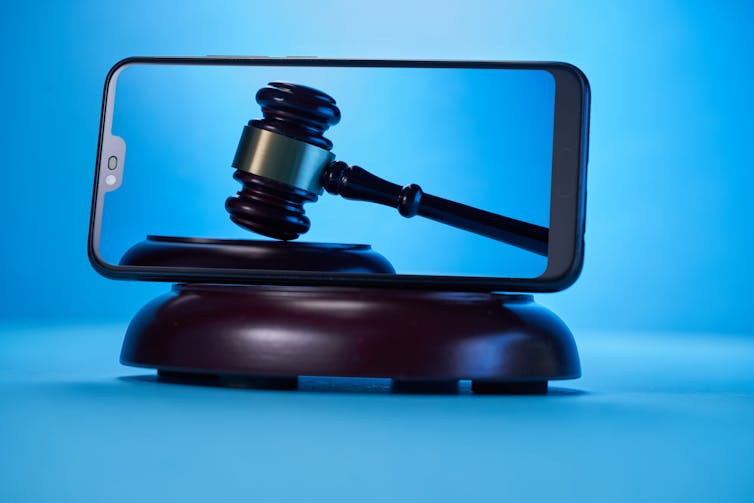
Experts in autocracies have pointed out that it is, unfortunately, easy to slip into normalizing the tyrant, hence it is important to hang on to outrage. These incidents which seem to call for the efforts of the Greek Furies (Erinyes) to come and deal with them will, I hope, help with that. As a reminder, though no one really knows how many there were supposed to be, the three names we have are Alecto, Megaera, and Tisiphone. These roughly translate as “unceasing,” “grudging,” and “vengeful destruction.”
Heaven knows we have a Second Amendment problem in the United States. But the magnitude of our Second Amendment problem partly stems from, and also distracts from, the huge First Amendment problem we also have – which we have had for a long time, but which has been made painfully obvious by the rise of the internet and social media.
To put it bluntly, hate speech leads to violence, and wide availability of guns leads to that violence being gun violence. To paraphrase the reasoning attributed to Karl Popper, a society cannot be a tolerant society if it tolerates intolerance. It’s easy to say – but it’s extremely hard to legislate and regulate. That’s why I was immediately drawn to this article about what regulating social media need to look like.
Because we cannot afford THIS.
==============================================================
What social media regulation could look like: Think of pipelines, not utilities

new look casting/iStock via Getty Images
Theodore J. Kury, University of Florida
Elon Musk’s takeover of Twitter, and his controversial statements and decisions as its owner, have fueled a new wave of calls for regulating social media companies. Elected officials and policy scholars have argued for years that companies like Twitter and Facebook – now Meta – have immense power over public discussions and can use that power to elevate some views and suppress others. Critics also accuse the companies of failing to protect users’ personal data and downplaying harmful impacts of using social media.
As an economist who studies the regulation of utilities such as electricity, gas and water, I wonder what that regulation would look like. There are many regulatory models in use around the world, but few seem to fit the realities of social media. However, observing how these models work can provide valuable insights.
Not really economic regulation
The central ideas behind economic regulation – safe, reliable service at fair and reasonable rates – have been around for centuries. The U.S. has a rich history of regulation since the turn of the 20th century.
The first federal economic regulator in the U.S. was the Interstate Commerce Commission, which was created by the Interstate Commerce Act of 1887. This law required railroads, which were growing dramatically and becoming a highly influential industry, to operate safely and fairly and to charge reasonable rates for service.
The Interstate Commerce Act reflected concerns that railroads – which were monopolies in the regions that they served and provided an essential service – could behave in any manner they chose and charge any price they wanted. This power threatened people who relied on rail service, such as farmers sending crops to market. Other industries, such as bus transportation and trucking, would later be subjected to similar regulation.
Individual social media companies don’t really fit this traditional mold of economic regulation. They are not monopolies, as we can see from people leaving Twitter and jumping to alternatives like Mastodon and Post.
While internet access is fast becoming an essential service in the information age, it’s debatable whether social media platforms provide essential services. And companies like Facebook and Twitter don’t directly charge people to use their platforms. So the traditional focus of economic regulation – fear of exorbitant rates – doesn’t apply.
Fairness and safety
In my view, a more relevant regulatory model for social media might be the way in which the U.S. regulates electricity grid and pipeline operations. These industries fall under the jurisdiction of the Federal Energy Regulatory Commission and state utility regulators. Like these networks, social media carries a commodity – here it’s information, instead of electricity, oil or gas – and the public’s primary concern is that companies like Meta and Twitter should do it safely and fairly.
In this context, regulation means establishing standards for safety and equity. If a company violates those standards, it faces fines. It sounds simple, but the practice is far more complicated.
First, establishing these standards requires a careful definition of the regulated company’s roles and responsibilities. For example, your local electric utility is responsible for delivering power safely to your home. Since social media companies continuously adapt to the needs and wants of their users, establishing these roles and responsibilities could prove challenging.
Texas attempted to do this in 2021 with HB 20, a law that barred social media companies from banning users based on their political views. Social media trade groups sued, arguing that the measure infringed upon their members’ First Amendment rights. A federal appellate court blocked the law, and the case is likely headed to the Supreme Court.

AP Photo/Saul Loeb
Setting appropriate levels of fines is also complicated. Theoretically, regulators should try to set a fine commensurate with the damage to society from the infraction. From a practical standpoint, however, regulators treat fines as a deterrent. If the regulator never has to assess the fine, it means that companies are adhering to the established standards for safety and equity.
But laws often inhibit agencies from energetically policing target industries. For example, the Office of Enforcement at the Federal Energy Regulatory Commission is concerned with safety and security of U.S. energy markets. But under a 2005 law, the office can’t levy civil penalties higher than US$1 million per day. In comparison, the cost to customers of the California power crisis of 2000-2001, fueled partially by energy market manipulation, has been estimated at approximately $40 billion.
In 2022 the Office of Enforcement settled eight investigations of violations that occurred from 2017 to 2021 and levied a total of $55.5 million in penalties. In addition, it opened 21 new investigations. Clearly, the prospect of a fine from the regulator is not a sufficient deterrent in every instance.
From legislation to regulation
Congress writes the laws that create regulatory agencies and guide their actions, so that’s where any moves to regulate social media companies will start. Since these companies are controlled by some of the wealthiest people in the U.S., it’s likely that a law regulating social media would face legal challenges, potentially all the way to the Supreme Court. And the current Supreme Court has a strong pro-business record.
If a new law withstands legal challenges, a regulatory agency such as the Federal Communications Commission or the Federal Trade Commission, or perhaps a newly created agency, would have to write regulations establishing social media companies’ roles and responsibilities. In doing so, regulators would need to be mindful that changes in social preferences and tastes could render these roles moot.
Finally, the agency would have to create enforcement mechanisms, such as fines or other penalties. This would involve determining what kinds of actions are likely to deter social media companies from behaving in ways deemed harmful under the law.
In the time it would take to set up such a system, we can assume that social media companies would evolve quickly, so regulators would likely be assessing a moving target. As I see it, even if bipartisan support develops for regulating social media, it will be easier said than done.![]()
Theodore J. Kury, Director of Energy Studies, University of Florida
This article is republished from The Conversation under a Creative Commons license. Read the original article.
==============================================================
Alecto, Megaera, and Tisiphone, Heather Cox Richardson closed her Letter for December 14 with this: “[I]n June, the Supreme Court handed down the sweeping New York State Rifle & Pistol Association, Inc. v. Bruen decision requiring those trying to place restrictions on gun ownership to prove similar restrictions were in place when the Framers wrote the Constitution. Already, a Texas judge has struck down a rule preventing domestic abusers from possessing firearms on the grounds that domestic violence was permissible in the 1700s.” (Emphasis mine)
Originalism. If it isn’t checked, it will kill us all. And the founders would absolutely not have wanted it. They were not idiots – they knew that circumstances would change, and that government of, by, and for the people would need to change with them. They said so – including in the Constitution itself – if not, why would they have included in it a provision for amending it?
I do have one thought regarding the setting of the amounts of fines for non-compliance. Setting dollar amounts clearly doesn’t work – values change and fines simply become an accepted “cost of doing business.” We need to start settimg fines not as “no more than X dollars” but instead as “not greater than Z percent of the defendant’s total net worth,” or some other indicator. “Y percent of the degendant’s gross annual profits in the most recent year” might work.
The Furies and I will be back.







